
Annals of Economics and Finance
Scope & Guideline
Innovating Research for Tomorrow's Economic Challenges.
Introduction
Aims and Scopes
- Economic Behavior and Decision-Making:
The journal explores how individuals and firms make economic decisions, including consumption patterns, investment choices, and corporate governance, often utilizing behavioral economics frameworks. - Monetary and Fiscal Policy Analysis:
Research focusing on the implications of monetary and fiscal policies, particularly in relation to inflation, interest rates, and economic growth, with a strong emphasis on empirical evidence from various economies. - Financial Markets and Asset Pricing:
The journal publishes studies on the dynamics of financial markets, asset pricing models, and the influence of macroeconomic factors on market behavior, contributing to the understanding of risk and return. - Development Economics:
There is a consistent focus on development issues, particularly in the context of emerging economies like China, analyzing factors such as human capital, institutional frameworks, and economic growth. - International Trade and Economic Openness:
Research in this area examines the impact of trade policies, globalization, and economic openness on domestic economies, with an emphasis on empirical studies and case analyses. - Technological Change and Economic Impact:
The journal addresses the effects of digitalization, AI, and other technological advancements on economic structures, labor markets, and international trade.
Trending and Emerging
- Impact of Digitalization on Economy and Trade:
With the rise of digital technologies and AI, there is an increasing exploration of how these innovations affect international trade, market structures, and economic performance, signaling a significant trend in economic research. - Behavioral Insights in Economic Decision-Making:
Research incorporating behavioral economics principles is gaining traction, focusing on how psychological factors influence consumer and corporate decisions, particularly in uncertain environments. - Sustainability and Economic Growth:
Themes surrounding sustainable development, including sustainable debt policies and the impact of climate change on economic growth, are becoming more prominent, reflecting a broader societal concern for environmental issues. - Economic Inequality and Policy Responses:
There is a growing emphasis on understanding economic inequality and its implications for policy, with studies addressing wage inequality, labor mobility, and the effects of public expenditure on growth. - The Role of Institutional Frameworks in Economic Performance:
Emerging research is increasingly focusing on how institutional quality and governance affect economic outcomes, particularly in developing countries, highlighting the importance of institutional analysis.
Declining or Waning
- Traditional Labor Economics:
Research focusing on classical labor economics concepts, such as labor supply and demand dynamics, has become less prominent, possibly due to the increasing complexity of labor market issues that require more nuanced approaches. - Static Economic Models:
There appears to be a waning interest in static models of economic behavior, as researchers increasingly favor dynamic models that account for the evolving nature of economic interactions over time. - Historical Economic Analysis:
While historical perspectives remain important, fewer studies are appearing that focus solely on historical economic events, suggesting a shift towards more contemporary and forward-looking economic analyses. - Simple Taxation Models:
The discussion around straightforward tax models has diminished, with researchers favoring more complex models that incorporate behavioral responses and economic interactions.
Similar Journals
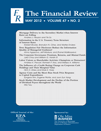
FINANCIAL REVIEW
Your Gateway to High-Impact Financial ResearchFINANCIAL REVIEW, a premier journal in the fields of Economics and Finance, is published by Wiley and has been contributing to the body of knowledge since its inception in 1969. With an impressive track record reflected by its Q1 ratings in both Economics and Econometrics as well as Finance, this journal stands out as a crucial resource for researchers, professionals, and students alike. The journal hosts a diverse array of scholarly articles that not only address contemporary financial issues but also provide innovative insights into economic theories and practices. Although it does not offer open access, its high impact factor and strong Scopus rankings—ranking #275 out of 716 in Economics and Econometrics and #125 out of 317 in Finance—underscore its significance in advancing academic discourse and influencing policy in the financial sector. Researchers are encouraged to explore the latest findings and methodologies shared in this esteemed journal, ensuring they remain at the forefront of their fields.

Annual Review of Financial Economics
Catalyzing Discourse in Economic and Financial ResearchAnnual Review of Financial Economics, published by Annual Reviews, stands as a pivotal journal in the fields of Economics and Finance, recognized for its rigorous analysis and comprehensive reviews since its inception in 2010. With an impressive impact factor reflected in its Q1 ranking in both Economics and Econometrics and Finance for 2023, this journal serves as an essential resource for researchers, professionals, and students keen on understanding the dynamic interplay of financial theories and practices. The ISSN 1941-1367 and E-ISSN 1941-1375 signal its commitment to accessibility and dissemination of cutting-edge research within the community. Addressing crucial topics from market behavior to economic modeling, each annual volume synthesizes the latest findings and theoretical advancements, thus contributing significantly to the global discourse within financial economics. With its high Scopus rankings, including a finance rank of #75 out of 317, the journal continues to foster a deep understanding of financial systems and their implications, serving as an invaluable tool for anyone engaged in the broader economic landscape.

Montenegrin Journal of Economics
Illuminating the Path of Economic DevelopmentMontenegrin Journal of Economics, published by ECONOMIC LABORATORY TRANSITION RESEARCH PODGORICA-ELIT, stands as a prominent platform for scholarly discourse in the field of Economics, Econometrics, and Finance. With an ISSN of 1800-5845 and an E-ISSN of 1800-6698, this open access journal has been providing accessible research output since 2005, contributing significantly to the global academic community. The journal’s impact is reflected in its Q2 ranking in the 2023 category of Economics, Econometrics and Finance, holding a commendable position within the 81st percentile according to Scopus rankings. The scope includes a wide array of topics pertinent to economics and finance, encouraging contributions that enhance understanding of both local and global markets. With a focus on quality research, the journal aims to disseminate knowledge that supports informed policy-making and fosters economic development, making it an invaluable resource for researchers, professionals, and students dedicated to the evolving landscape of economic studies.
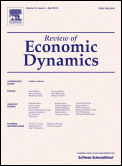
REVIEW OF ECONOMIC DYNAMICS
Transforming Economic Analysis for a Changing WorldREVIEW OF ECONOMIC DYNAMICS, published by Academic Press Inc, Elsevier Science, is a leading academic journal in the field of economics and econometrics, holding a distinguished Q1 ranking in its category as of 2023. With an impactful focus on the theoretical and empirical analysis of dynamic economic systems, the journal seeks to advance our understanding of economic dynamics through innovative research that addresses contemporary issues and policy implications. The journal boasts a significant history of contributions from renowned scholars since its inception in 1998, and will continue to publish through 2025. Although it does not currently offer open access options, the journal serves as a crucial resource for researchers, professionals, and students who are keen to explore and engage with the latest findings in economic theory and practice. With a current Scopus rank of #280 out of 716 in the Economics and Econometrics category, the REVIEW OF ECONOMIC DYNAMICS remains an invaluable platform for scholarly discussion and insight into the complexities of economic behavior.
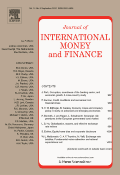
JOURNAL OF INTERNATIONAL MONEY AND FINANCE
Navigating the complexities of international monetary dynamics.JOURNAL OF INTERNATIONAL MONEY AND FINANCE is a premier scholarly publication dedicated to advancing the understanding of international finance and monetary economics. Published by Elsevier Science Ltd, this esteemed journal has been disseminating critical research since its inception in 1982 and will continue to contribute to the field through 2024. With a strong international presence and headquarters in the United Kingdom, the journal boasts an impressive collection of articles that explore significant trends, challenges, and innovations in the areas of economics and finance. Recognized for its impact, it ranks in the top quartile (Q1) in both the Economics and Econometrics and Finance categories as of 2023, signifying its influence and relevance among peers. Researchers, professionals, and students in these disciplines can benefit from the journal's rigorous peer-review process, ensuring high-quality scholarly outputs. Though not currently an open-access journal, it provides various subscription options to foster access to groundbreaking research in the financial ecosystem.

JOURNAL OF FINANCIAL ECONOMICS
Uncovering cutting-edge studies in financial economics.Welcome to the JOURNAL OF FINANCIAL ECONOMICS, a premier publication in the realms of finance, economics, and accounting, published by Elsevier Science SA in the Netherlands. With its impactful contributions since 1974, this esteemed journal has earned an impressive impact factor and consistently ranks in the Q1 category across various fields, including Accounting, Economics and Econometrics, Finance, and Strategy and Management. Researchers can access cutting-edge studies that delve into both theoretical frameworks and empirical analyses, crucial for advancing financial literacy and economic policies globally. With remarkable Scopus rankings, notably placing #2 in Accounting and #6 in Finance, the journal serves not only as a reliable resource for academics but also as a vital tool for professionals seeking to stay abreast of the latest financial trends and insights. Engage with the latest research and contribute to the dialogue shaping the future of financial economics!
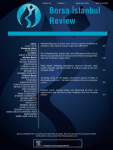
Borsa Istanbul Review
Elevating research standards in Economics and Finance.Borsa Istanbul Review, published by ELSEVIER, is a premier open-access journal making significant contributions to the field of Economics and Finance since its inception in 2013. With a commendable Q1 rating in both categories according to the 2023 metrics, this journal ranks impressively at #36 out of 317 in Finance and #91 out of 716 in Economics and Econometrics on Scopus, placing it in the top tier of international academic publications. The journal not only provides a platform for rigorous and innovative research but also aims to foster a deeper understanding of the evolving economic landscape, particularly within the frameworks of emerging markets. Catering to researchers, professionals, and students alike, Borsa Istanbul Review is dedicated to delivering high-quality, peer-reviewed scholarly articles that are freely accessible to enhance global research collaboration. It serves as an essential resource for anyone looking to stay abreast of cutting-edge developments in the financial and economic sectors.
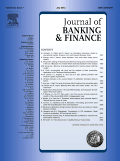
JOURNAL OF BANKING & FINANCE
Elevating Academic Discourse in Finance and EconomicsWelcome to the Journal of Banking & Finance, a premier publication in the fields of finance and economics, expertly published by Elsevier. With its esteemed Q1 ranking in both the Economics and Econometrics and Finance categories for 2023, this journal frequently garners significant attention from researchers, professionals, and academics alike. Established in 1977, it has become a crucial resource for the latest research and advancements in banking and financial services, influencing policies and practices on a global scale. The journal's commitment to high-quality, peer-reviewed content ensures that it not only contributes to academic discourse but also drives real-world financial innovation. As part of the respected Elsevier publishing collection, the journal's rigorous standards and comprehensive analysis serve as indispensable tools for those seeking to understand and navigate the complexities of the financial landscape. Located in the Netherlands, the Journal of Banking & Finance continues to play a vital role in shaping the future of financial research through its impactful insights and research contributions.

Journal of Economics Finance and Administrative Science
Transforming insights into impactful solutions.Journal of Economics Finance and Administrative Science, published by Emerald Group Publishing Ltd, is a premier open-access journal that has been at the forefront of advancing knowledge since its inception in 2012. With an ISSN of 2077-1886 and E-ISSN of 2218-0648, the journal caters to the disciplines of economics, finance, and administrative sciences within an international context, specifically observing trends from Peru and beyond. This highly regarded journal holds a Q1 ranking in Economics, Econometrics and Finance for 2023, landing it in the top percentile among its peers, with an impressive Scopus rank of #33 out of 288 in general economics. Since transitioning to open access in 2017, the journal has democratized access to cutting-edge research, making it indispensable for researchers, professionals, and students alike. By publishing rigorous empirical studies, comprehensive reviews, and innovative theoretical contributions, the Journal of Economics Finance and Administrative Science aims to facilitate knowledge exchange and foster collaboration within the global academic community.

REVIEW OF WORLD ECONOMICS
Empowering Scholars with Cutting-Edge ResearchREVIEW OF WORLD ECONOMICS, published by Springer, stands at the forefront of economic literature, providing a comprehensive platform for scholarly articles that address contemporary global economic issues. With a distinguished Q1 ranking in the field of Economics, Econometrics, and Finance as of 2023, this journal is recognized among the top tier of academic publications, validating its commitment to high-quality research outputs. The journal's Scopus ranking places it at an impressive 70 out of 288 in the discipline, further exemplifying its relevance and impact within the academic community. Covering a wide array of topics from theoretical frameworks to empirical analyses, the REVIEW OF WORLD ECONOMICS invites contributions that not only enhance the understanding of economic phenomena but also propose actionable solutions. With an inclusive open access model enabling broader dissemination, this journal serves as an essential resource for researchers, professionals, and students alike, enriching the global discourse on economics from its base in Germany.